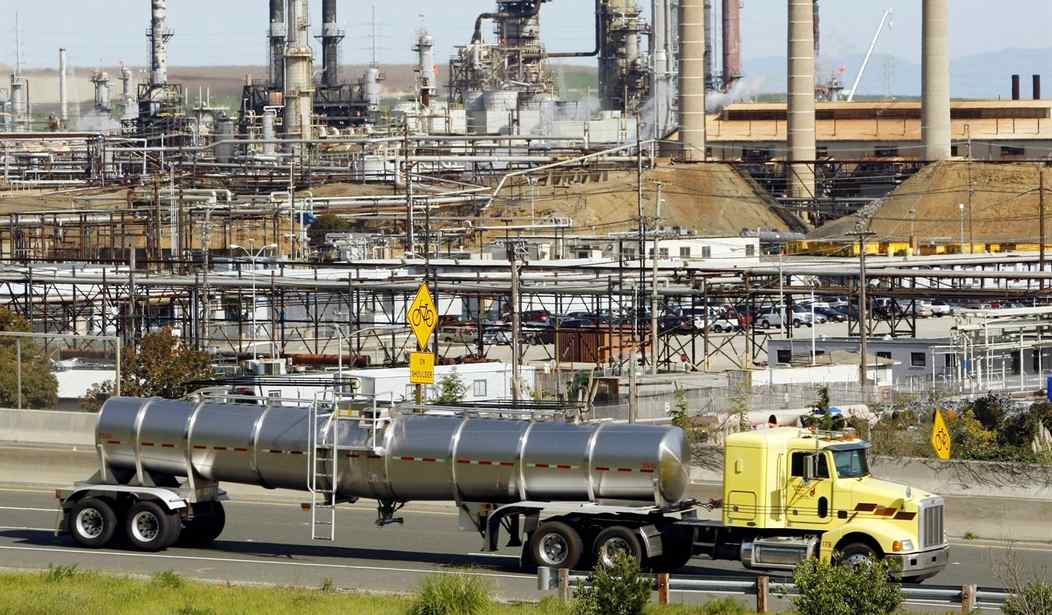No one really likes the big oil companies. Exxon, Shell, Chevron, ConocoPhillips, and BP won’t win any popularity contests.
But if you stop and think about the near-miracle of getting oil from deep underground, refining it, and bringing it to the pump, you might hold a tiny bit of appreciation for what these companies do and what it would be like to live in a world without them.
The oil companies know we depend on them for survival, which makes them insufferably smug. But when climate hysterics attack an entire industry based on the misguided and misinformed opinion that they could have prevented the climate crisis, perhaps we should defend Big Oil from the depredations of idiot politicians who look to gain political favor by suing them for nonsensical reasons.
“The companies that have polluted our air, choked our skies with smoke, wreaked havoc on our water cycle, and contaminated our lands must be made to mitigate the harms they have brought upon the State,” California’s suit says.
If that doesn’t sound like a political speech, nothing does.
No, Big Oil does not need our help to defend it. That’s why these companies have legal departments with more money than God.
“We do not believe the courtroom is the right venue to address climate change, but that smart policy from government and action from all sectors is the appropriate way to reach solutions and drive progress,” Shell spokesperson Anna Arata said in an email.
“This ongoing, coordinated campaign to wage meritless, politicized lawsuits against a foundational American industry and its workers is nothing more than a distraction from important national conversations and an enormous waste of California taxpayer resources,” American Petroleum Institute Senior Vice President and General Counsel Ryan Meyers said in a statement. “Climate policy is for Congress to debate and decide, not the court system.”
A spokesperson for Newsom said the timing was motivated in part by the Supreme Court’s decision in April to allow existing suits from local governments to proceed in state court, rather than be moved to federal courts as oil companies wanted. State courts are seen as friendlier venues for plaintiffs seeking climate damages because they’re generally more receptive to considering state laws that deal with climate change.
“All these cases got tied up in years of procedural wrangling; oil companies doing everything they could to drag their feet,” said spokesperson Alex Stack. The “Supreme Court finally let these cases go forward this spring — the state as a whole is joining cities and counties.”
The basis for the suit goes all the way back to the 1970s when an obscure scientist for Exxon warned of climate change.
In their eight-month-long investigation, reporters at InsideClimate News interviewed former Exxon employees, scientists and federal officials and analyzed hundreds of pages of internal documents. They found that the company’s knowledge of climate change dates back to July 1977, when its senior scientist James Black delivered a sobering message on the topic. “In the first place, there is general scientific agreement that the most likely manner in which mankind is influencing the global climate is through carbon dioxide release from the burning of fossil fuels,” Black told Exxon’s management committee. A year later he warned Exxon that doubling CO2 gases in the atmosphere would increase average global temperatures by two or three degrees—a number that is consistent with the scientific consensus today. He continued to warn that “present thinking holds that man has a time window of five to 10 years before the need for hard decisions regarding changes in energy strategies might become critical.” In other words, Exxon needed to act.
Dr. Black’s warnings went unheeded, so the entire oil industry is culpable. Never mind that Black — like every other climate modeler — was wrong about the imminent threat of climate change. “A time window of 5 to 10 years” sounds familiar. This was in 1977. And yet, here we are in 2023, and the planet is still kicking.
These suits aren’t likely to yield any cash for California — not for a couple of decades. Who knows? Maybe the continued assaults on fossil fuels will destroy the oil companies before California sees a dime of “climate reparations.”










Join the conversation as a VIP Member